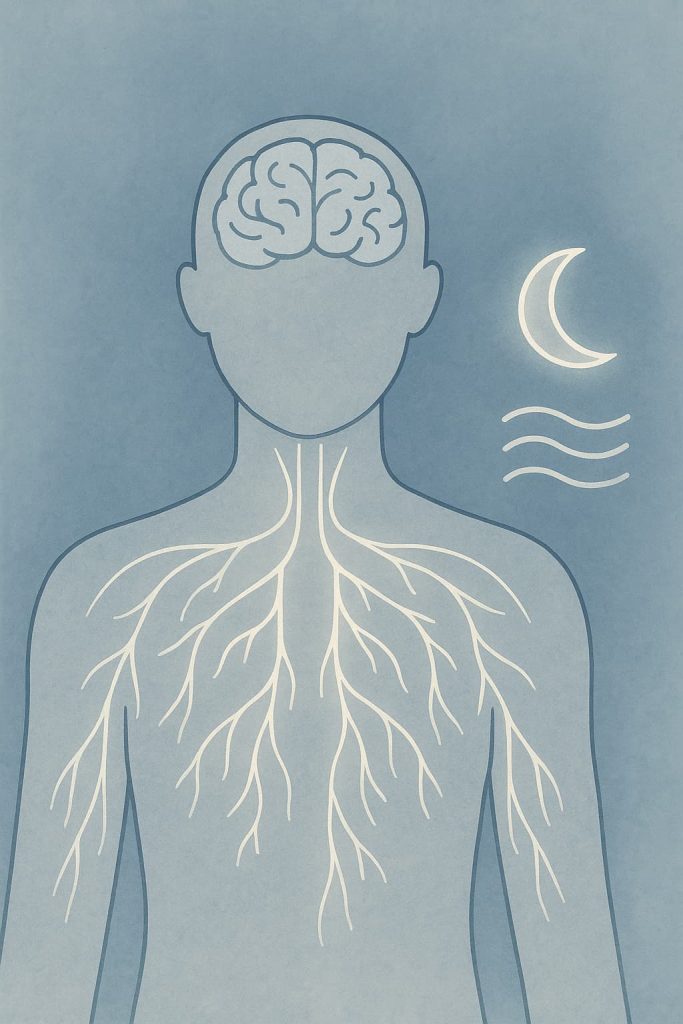If you’ve seen magnesium for sleep trending lately, you’re not alone. From wellness influencers to doctors, everyone seems to be talking about this simple mineral as a natural sleep aid. But does it really work — or is it just another bedtime trend?
According to sleep researchers and the National Institutes of Health (NIH), magnesium supports over 300 processes in the body — from nerve and muscle function to blood pressure, stress regulation, and energy balance. Some people swear by taking it an hour before bed to drift off faster and wake up less during the night, while others barely notice a difference.
So what does the science actually say? Let’s look at how magnesium supports sleep, which types work best, and how to use it safely for deeper, more restful nights.
What Magnesium Does for Your Body (and Your Sleep)

Magnesium quietly supports almost every system in your body — especially the ones that help you relax at night. According to research from the National Center for Biotechnology Information (NCBI), this mineral plays a key role in balancing the nervous system, regulating melatonin (your sleep hormone), and activating GABA, a neurotransmitter that signals your brain it’s time to rest.
When magnesium levels drop, your muscles can feel tight, your mind stays active, and stress hormones like cortisol remain elevated — all things that make it harder to fall and stay asleep.
The Science Behind Magnesium for Sleep
Several small but promising studies have found that taking magnesium before bed can:
- Help you fall asleep faster
- Improve overall sleep quality
- Reduce nighttime awakenings
In short, magnesium doesn’t force your body to sleep — it helps it remember how. By supporting the natural shift from “go mode” to “rest mode,” magnesium gives your nervous system what it needs to truly unwind.
Are You Low on Magnesium?
Even a mild deficiency can impact your sleep and mood. You might be low if you:
- Feel restless or have muscle twitches at night
- Struggle with anxiety or frequent waking
- Eat few leafy greens, nuts, or whole grains
Low magnesium levels are especially common in older adults, people under chronic stress, and anyone eating a mostly processed diet. The Mayo Clinic notes that many adults don’t meet their daily magnesium needs — and that can quietly erode sleep quality over time.
Knowing how magnesium works is one thing — but what does the research actually show about its impact on sleep?
What the Research Actually Says
So, does magnesium really help you sleep — or is it just another wellness trend?
The short answer: the science looks promising, but it isn’t definitive.
Research from the National Institutes of Health (NIH) and Sleep Medicine Reviews shows that magnesium supplementation can improve overall sleep quality, especially in people who are low in magnesium or have insomnia. In several small studies, participants reported falling asleep faster, waking up fewer times during the night, and feeling more refreshed in the morning.
Scientists believe this happens because magnesium helps regulate two key systems:
- Melatonin, your body’s sleep hormone that controls the sleep–wake cycle
- Cortisol, the stress hormone that can keep you alert long after you’ve turned off the lights
When these hormones are balanced, your body finds it easier to relax and transition into deeper stages of sleep.
Experts agree, though, that magnesium isn’t a quick-acting sedative. It’s better thought of as a supportive mineral — something that helps your body restore its natural sleep rhythm, particularly when stress, age, or poor diet have thrown things off balance.
If you already get plenty of magnesium from food and have healthy sleep habits, you may not notice much change. But if you’re often restless or fall short on magnesium, taking a supplement may help your body relax more easily and support deeper, more restorative sleep over time.
If you’re considering trying magnesium, the next step is choosing the right form — because not all types work the same for sleep.
Posts You May Like:
- Should You Shower Before Bed for Better Sleep?
- How to Use Meditation for Sleep: A Step-by-Step Guide
- 7 Herbal Teas for Better Sleep and Stress Relief
The Different Types of Magnesium (and Which One Works Best for Sleep)

Not all magnesium supplements work the same way — and that’s often why some people notice great results while others don’t feel much difference. Each form absorbs a little differently and has its own benefits.
Magnesium glycinate is the form most sleep experts recommend. It’s highly absorbable, gentle on the stomach, and helps calm the nervous system thanks to glycine — an amino acid known for its relaxing effect. If your goal is steady, restful sleep without digestive side effects, this is the best place to start.
Magnesium citrate is another good option, especially if you also deal with occasional constipation or digestive sluggishness. It absorbs well but can have a mild laxative effect, so it’s better to take earlier in the evening rather than right before bed.
Magnesium oxide is common and inexpensive, but it isn’t absorbed as well and may cause bloating or cramps in some people.
You might also hear about magnesium threonate, which supports brain health and focus. Some research suggests it may help with stress and relaxation, but there isn’t enough evidence yet to confirm its benefits for sleep specifically.
💤 Best Choice for Sleep
If your main goal is calm and better rest, magnesium glycinate is your best bet. It binds magnesium to glycine — an amino acid with its own soothing effect — making it easier for your body to use at night.
Some people also use magnesium citrate earlier in the evening (about two hours before bed) to avoid digestive discomfort. But magnesium oxide, while widely available, isn’t ideal for improving sleep quality.
How to Take Magnesium for Better Sleep

Once you’ve picked the right type of magnesium, the next step is knowing how to take it so your body can use it effectively. Timing, dosage, and consistency make a real difference in how well it works.
When to Take It
Take magnesium about one to two hours before bed. That gives your body enough time to absorb it and start easing into relaxation mode by the time you’re ready to sleep.
If you’re using magnesium citrate, try taking it a little earlier in the evening to avoid its mild laxative effect.
How Much to Take
Most adults do well with 200 to 400 mg per night, according to the Office of Dietary Supplements (ODS). Start on the lower end — around 200 mg — and see how your body responds. Too much can lead to bloating or diarrhea, so it’s best to increase slowly if needed.
Always check the label for the amount of elemental magnesium, which is the actual usable mineral, not just the total compound weight.
Pair It with Food (or a Bedtime Ritual)
Taking magnesium with a small snack or a cup of warm herbal tea can improve absorption and reduce the chance of stomach discomfort. Many people pair it with chamomile or lemon balm tea for an extra calming effect before bed.
In my experience as a sleep coach, combining magnesium with a screen-free wind-down routine — such as reading or light stretching — helps your body recognize it’s time to rest.
Be Consistent
Like most natural sleep supports, magnesium works best when you use it regularly. Give it two to three weeks before judging results. Your body needs time to restore its mineral balance and settle into a more natural sleep rhythm.
Side Effects and Safety
For most people, magnesium is safe to take daily — but as with any supplement, more isn’t always better.
Taking too much can lead to stomach upset, diarrhea, or bloating, especially if you start with a high dose. Begin low and listen to your body.
If you have kidney disease, heart issues, or take prescription medications — such as blood pressure pills or proton pump inhibitors for reflux — talk to your doctor before adding magnesium. According to the Office of Dietary Supplements (ODS), these medications can affect how your body absorbs or eliminates magnesium.
Also, be selective about the brand you buy. Supplements aren’t regulated the same way as medications, so look for products that have been third-party tested or carry a USP (United States Pharmacopeia) or NSF seal. These marks confirm that what’s on the label matches what’s in the bottle.
And while topical magnesium sprays or lotions may feel soothing, studies show that very little magnesium is actually absorbed through the skin. They can be relaxing as part of a bedtime routine, but oral supplements are more effective for raising your magnesium levels.
Bottom Line

When it comes to natural sleep aids, magnesium for sleep is one of the simplest and best-supported options. Research from the Mayo Clinic and the National Institutes of Health (NIH) shows that magnesium helps regulate melatonin, calm the nervous system, and ease nighttime restlessness — all key ingredients for deeper rest.
In my experience as a sleep coach, many people who struggle with stress or “busy mind” nights notice a real difference once they add magnesium glycinate to their bedtime routine. It’s not a quick fix, but with consistent use and healthy sleep habits — like dim lighting, limited screen time, and a cool, quiet room — magnesium can help you fall asleep faster and wake up feeling more refreshed.
FAQs About Magnesium for Sleep
What type of magnesium is best for sleep?
The best magnesium for sleep is magnesium glycinate. It’s easily absorbed by the body and helps calm the nervous system, which promotes relaxation and more restful sleep without upsetting your stomach.
Which is better for sleep, magnesium citrate or glycinate?
Both magnesium citrate and magnesium glycinate can support sleep, but glycinate is usually better. It’s gentler on digestion and more effective for calming the body. Magnesium citrate may be better earlier in the evening if you also want digestive support.
Is it okay to take magnesium every night for sleep?
Yes, it’s safe for most adults to take magnesium every night in moderate doses of 200–400 mg. Consistent use can support healthy magnesium levels and better sleep quality. Always check with your doctor if you have kidney issues or take prescription medications.
Is it better to take magnesium in the morning or night?
It’s better to take magnesium at night, about one to two hours before bed. Taking it in the evening supports relaxation, balances melatonin, and prepares your body for restful sleep.
Who should avoid magnesium?
People with kidney disease, heart problems, or anyone taking medications that affect magnesium levels should avoid supplements unless cleared by a doctor. Too much magnesium can build up in the body if it isn’t filtered properly.

